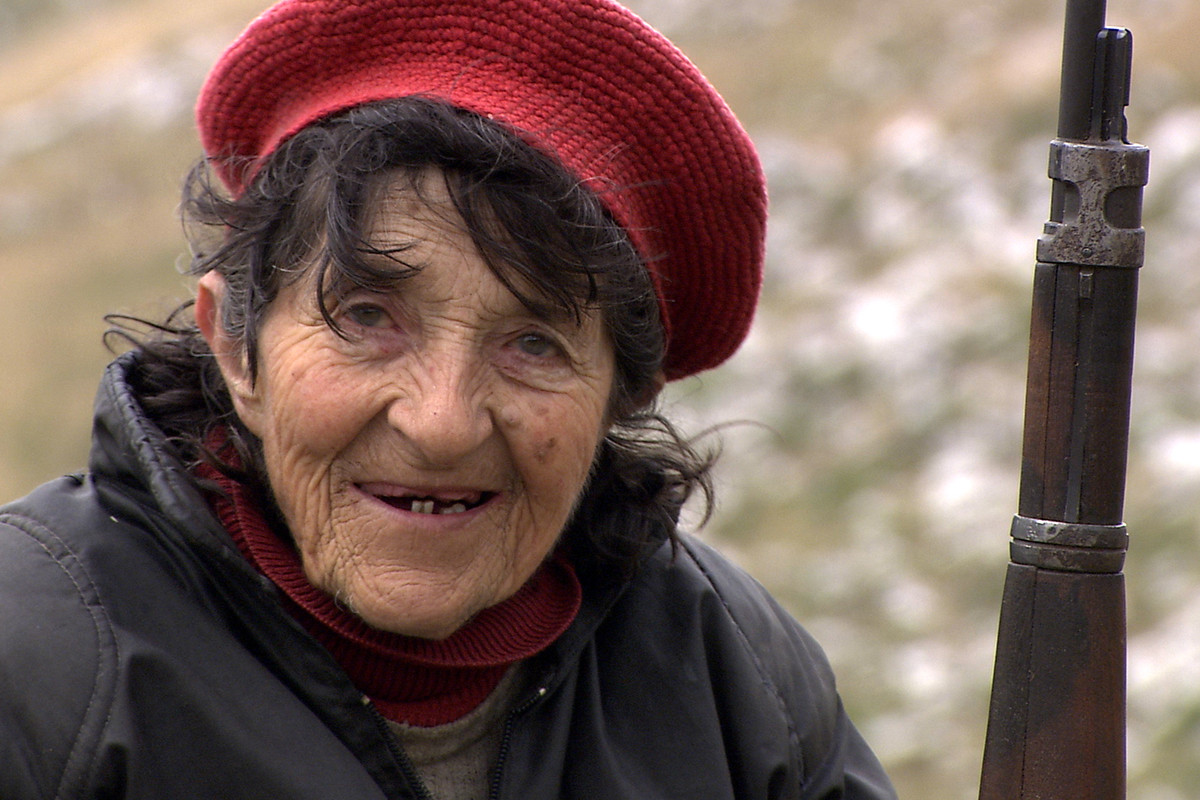SWORN VIRGIN
by Elvira Dones
Translated by Clarissa Botsford
& Other Stories, 256 pages
He will wear a hat with a tight fit and he will smoke and drink with formidable camaraderie. As zot shtëpie (“head of household”), his devotion to besa, the Albanian word of honor, is so strong that he will fight a bloodfeud to the bitter end. But his commitment to hospitality is just as fierce. He has been known to walk a stranger to the edge of town, ensuring a safe journey. And he may be a “sworn virgin” — a former woman who becomes the male household head in exchange for a vow of chastity, dressing as a man to earn the respect granted to a man, no different from any other zot working in the mountains.
Sworn virgins, who are found mostly in northern Albania, act and carry on as men, but do not undergo any surgical change. In 2000, it was estimated that there were 100 sworn virgins left in Albania. (Stana Cerovic, pictured above, is believed to be the last sworn virgin in Montenegro.) Antonia Young’s incredibly helpful book on the subject, Women Who Become Men, reveals that the vajzë e betuar is often raised to lead a family, with the choice to become patriarch made sometime after puberty. Western fiction readers may know of the custom from Alice Munro’s story, “The Albanian Virgin,” published in the June 27, 1994 issue of The New Yorker. But while the sworn virgin comes with some cultural relativism, especially when considering the subservient role of women in rural Albania, the underlying rites are quite complicated. The bride and the groom do not meet, with flirtation considered a boorish quality for a man. The bride sheds demonstrative tears when she leaves her family home and, as a wife, a woman is expected to perform quite a bit of labor, often more than the man. Custom dictates that a family in northern Albania, which is often as large as twenty members, cannot survive without a male leader. But it is this fascinating sworn virgin loophole, presented in the Kanun, that creates a uniquely Albanian fluidity.
Elvira Dones‘s engaging novel, Sworn Virgin (translated from Italian by Clarissa Botsford and regrettably the only Dones novel available in English), not only unpacks these fascinating gender questions, but transplants the issue between two nations. Dones’s protagonist Hana Doda (known as Mark back in Albania) moves to Rockville, Maryland, to land a job and begin a new life. Yet her new country’s demands present an altogether different identity crisis:
On the outside she looks almost like a woman. What’s missing is her vision, the point of view from which she is supposed to read the world. When she observes people, Hana does not see a woman or a man. She tries to penetrate the unique spirit of the individual, she analyzes their face and eyes, she tries to imagine the thoughts hiding behind those eyes, but she tends to avoid thinking about the fact that these thoughts are inextricably linked to the male or female ego. Women think like women. Men? Well, the answer is obvious. She’s only just realizing now that for a long time she has had to consider things from both points of view.
In the context of an America contending with greater and necessary LGBT acceptance, Hana’s search for “the unique spirit of the individual” is quite liberating. Would Project Runway mentor Tim Gunn feel as “conflicted” about trans models if he weren’t so committed to looking at the world with a regressive parallax view? Is it possible that an exceptional custom originating from tradition is more tolerant on this question than our purportedly democratic republic?
Dones alternates between Hana’s early years in America in 2001-2003 and her time in Albania, in which she becomes a sworn virgin (1986, 1996). We learn that the Albanian epithet malokë (“mountain yokel”) is not unlike “queer” in America: a vicious insult appropriated by its victims as a term of pride. We see that Hana’s family is committed to pretense, with her Uncle Gjergj presented as “an intelligent man but he often pretends that he’s not.” Gjergj is near death. Neither Gjergj nor Hana want to see the medication that goes down his gullet and keeps him alive. There is also the fragile health of Aunt Katrina, which proves more swift and fatal than Gjergj’s. Hana becomes torn in these early years of living life independently and fulfilling her inevitable familial obligation as a patriarch.
When Dones drops us back into Hana’s years in America, we see how swiftly Hana has changed, wondering if it will be easy for her to establish yet another new life. She must contend with shaving her legs and skirts that are too wide and operates having “no real experience of femininity,” and she must figure out the new rules of the game before her job interview. These assiduous concerns help Dones’s novel become more than a fresh spin on the immigrant novel. Is Hana working for a chain bookstore a sufficient substitute for Mark’s dutiful tasks as a shepherd keeping up a kulla (“family home”)? Which nation offers the greater conformity? What technicalities are available in America’s unmemorialized Kanun?
Dones succeeds greatly in devising a kind of Rorschach test around these demarcations. We are left with the consoling thought that no matter how traditional or boundary-breaking one’s temperament is, you can’t stop body and soul from expressing very specific desires on being alive.
